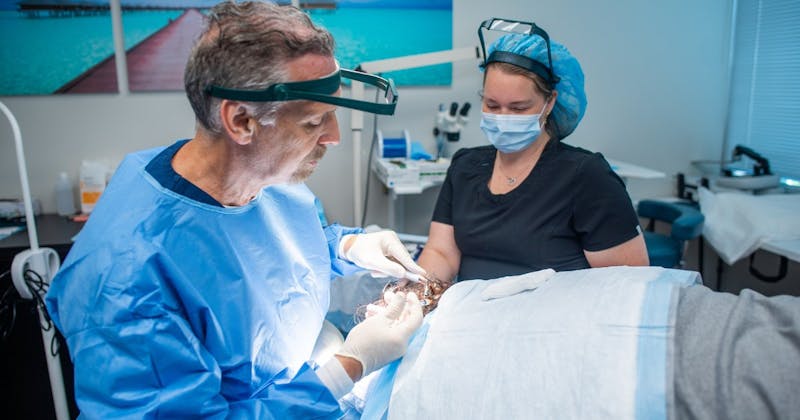Rooted in Results Let’s Get Growing
Hair loss is a symptom. We begin every journey by finding the cause, so your treatment plan isn’t just hopeful—it’s strategic, personalized, and proven to work.
Contact Our Team
The growing demand for hair loss treatments is showing no signs of stopping. In fact, the global hair growth supplement and treatment market size is estimated to be 7.73 billion, projected to reach 11.58 billion by 2030. This surge of interest from both men and women reflects a large demographic that is seeking effective solutions to restore confidence and overcome the emotional and physical effects of hair loss. But you may be wondering, which approach is right for you: non-surgical options vs. hair transplants?
Both have their benefits and drawbacks, which we will explore here today. It’s important to note, though, that no matter which solution you choose, our team here at Northeast Hair Restoration maintains its commitment to personalized hair loss treatment plans.
First off, it’s helpful to understand the causes of hair loss, and how to best treat each one. That’s because there is no one-size-fits-all solution to the challenges of hair loss, and every person’s journey is unique. From genetics and hormones to stress and aging, many factors can trigger hair loss and thinning.
Northeast Hair offers both surgical and non-surgical options depending on the condition you suffer from. But before we can craft a treatment plan, early consultation and diagnosis are both vital components of hair loss treatment in Boston.
More and more people are seeking non-surgical options for their hair loss as opposed to surgical options such as transplants. We typically start patients off with non-surgical options first to see if that will produce the desired results without resorting to transplantation.
For example, those with hair loss around the crown in their 20s or those who suffer from scarring alopecia should be stabilized first with less-aggressive treatment. Once stabilized, the decision to move to hair transplantation can be assessed if needed.
There are several options available to those who want less invasive hair loss treatments, such as:
While less invasive, non-surgical solutions come with certain limitations that can affect their long-term effectiveness. This is why it’s so important to weigh the benefits and drawbacks before taking this road. The pros and cons to taking a non-surgical approach to hair loss treatments include:
When non-surgical treatments aren’t cutting it, many people turn to surgical solutions for more permanent restoration. As said above, after starting off with non-surgical treatments, we can move on to hair transplant techniques that may be a better fit.
Modern hair transplant techniques include FUE (Follicular Unit Extraction), FUT (Follicular Unit Transplantation), and the No-Shave FUE. Each method involves relocating healthy hair follicles from donor areas to thinning zones, with the no-shave FUE becoming more and more popular for its discretion.
The option you choose will depend on many factors, from individual goals and lifestyle, to stage of hair loss and level of discretion desired. Another major factor in your decision is a consultation with one of our doctors: Dr. Brand or Dr. DiStefano – both experienced and respected hair transplant surgeons.
So which one is right for you: non-surgical options vs. hair transplants?
Many of our patients benefit from a combination of both approaches. But while both non-surgical options and hair transplants are effective hair loss treatments in Worcester, your unique needs and personal preferences will ultimately guide your choice.
We can help you determine the best hair loss treatment options tailored just for you. Schedule your FREE consultation online today in Boston or Worcester or call us at (774) 344-4049.